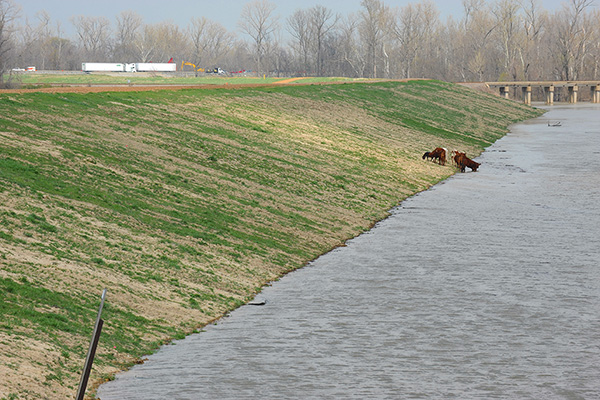The Mississippi River has undergone extensive river engineering for flood control, with its 3500-mile Mississippi River and Tributaries levee (artificial-embankment) system. However, researchers reported in Nature (April 2018) that disconnecting the lower Mississippi from its floodplain has increased the flood hazard. The researchers determined this, in part, by analyzing floodplain sediments deposited for the past 500 years. They discovered that both the frequency and extent of flooding have increased in the past 150 years. During this period, land-use development in the floodplain and levee building also increased. The researchers concluded that while some flooding could be attributed to an increase in extreme weather events as well as to climate cycles, such as those of the El Niño–Southern Oscillation (ENSO) and the Atlantic Multidecadal Oscillation (AMO), most of the increase in flooding has been caused by river engineering. See also: River; River engineering

All rivers flood and periodically spill onto their floodplains, which tend to be broad and flat valleys covered by vegetation. During a flood, the additional water has to go somewhere; floodplains function as temporary reservoirs, storing excess water and slowly releasing it back to the river. In addition, the shallow depth of, and vegetation on, floodplains tends to slow floodwater flow. As a result, floodplains reduce the severity of flooding and erosion downstream and beyond the floodplain. See also: Erosion; Floodplain; Geomorphology; Hydrology; Plains
Over time, floodplains along the Mississippi River have been built on or converted to farmland. These developments, in turn, have been protected by constructing levees. However, confining floodwater only increases the flood magnitude in a downstream direction or if floodwaters overtop levees. And building higher levees only raises the potential for more extreme flooding.
So, what to do? First, do not develop floodplains or build higher levees. And to improve on the flood hazard in the long term, the researchers recommend that strategies be developed that reconnect the Mississippi River with its floodplain.





